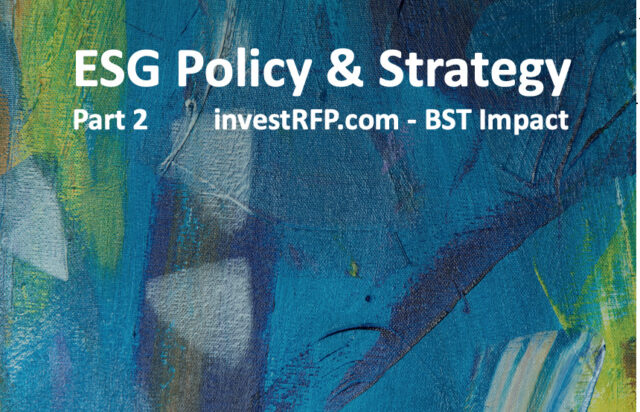By Kristina Touzenis, Managing Partner BST-Impact
| EU Regulation: SFDR
On 27th November 2019 EU Regulation No.2019/2088 on sustainability‐related disclosures in the financial services sector (SFDR) introduced a number of disclosure obligations for financial markets participants and financial advisers, most of which will become applicable tomorrow, 10th March 2021.
On 23rd April 2020, a public consultation on the content, methodologies and presentation of disclosures was launched by the European Supervisory Authorities (ESAs), and the Final Report on Draft Regulatory Technical Standards (RTS) was published on 2nd February 2021, leaving a very short time for implementation before the entry into force of the SFDR obligations (a general concern that was highlighted by the stakeholders who participated in the consultation, together with the need to ensure consistency with the Taxonomy Regulation and the Non-Financial Reporting Directive).
The SFDR aims at preventing greenwashing and ensuring data comparability through enhanced standardized transparency on sustainability within the financial markets. It provides proposals on sustainability disclosures in the field of principal adverse impact, pre-contractual product, website product, and product periodic disclosures. These obligations will impact not only EU entities, but also indirectly non-EU entities who provide services in the EU or use EU subsidiaries.
Besides requiring entities to understand the scope, severity, probability of occurrence and potentially irremediable character of the negative impact on the E that has been caused, compounded by or directly linked to its investment decisions and advice performed, the adverse sustainability impact set forth in the SFDR – mandatory for large entities and large holdings – requires considering the negative, material or likely to be material effects also on the S and the G, including requiring the publication of a statement on the entity’s website describing its due diligence policies in respect of these adverse impacts.
The SFDR defines mandatory and voluntary adverse sustainability indicators and metrics in relation to social and employee matters, respect for human rights, anti-corruption and anti-bribery. The pre-defined sustainability factors provided in a template include 16 social mandatory indicators and 7 social voluntary indicators.
| Data Challenge – Impact on ESG Policy and Strategy
This has resulted to be overall widely supported among stakeholders, although a big challenge that will likely be encountered in delivering these indicators will be the lack of data and the absence of a reliable source to calculate social and governance related indicators.
This data challenge will also have an impact on the level of confidence asset owners and asset managers will have when defining the ESG policy and strategy.
Despite acknowledging these concerns in its final report, the ESAs have reiterated that “the inclusion of social indicators with this package of RTS is beneficial in terms of simplicity and predictability for financial market participants and for comparability purposes for investors”.
This article is the Part 2 of a series on “ESG Policy & Strategy”
Part 1: Why asset owners need a good sustainable investment policy and strategy?
Part 2: SFDR aims at preventing greenwashing and ensuring data comparability
Part 3: Working towards the SDGs – at 360 degrees
Part 4: Due Diligence, Supervision and Enforcement Mechanisms
Part 5: Bringing down to “Earth”
Part 7: ESG as a real sustainability tool
Part 8: Awareness and attention towards rights and starndards
Part 10: ESG Policy & Strategy – Key Questions
Expert/Specialist Feedback on investRFP | Kristina Touzenis | BST-Impact
| about
Kristina Touzenis is the Managing Partner of BST Impact. A lawyer and a recognized leader in the effective and concrete operationalization of international human rights standards and principles in complex settings worldwide requiring long-term engagement with a multitude of stakeholders, form both the public and private sectors. She has more than 20 years of experience in advocacy, human rights reporting, monitoring, and evaluating as well as in policy making and negotiating at national, regional, and global level. Kristina founded BST Impact with two other partners in mid 2020, together with a pool of experts to help companies and investors to effectively operationalize ESG criteria, SDGs, international norms and the Business and Human Rights agenda into their respective sustainable business strategies, investment processes and risk assessment management systems. Previously, Kristina created the International Law Unit at the International Organization for Migration – IOM, the UN Agency for Migration and served as Head of the Unit from 2011 to 2020. She engaged with government counterparties on legislation development and review as well as with other Agencies within the UN common system, on advocacy and implementation of programmes worldwide. Prior to her appointment at the IOM HQ, Kristina worked from 2006 to 2011 in the IOM Regional Office for the Mediterranean Region, on translating international norms and standards into practice on the ground and from 2002 to 2006 on implementing children’s rights in the Mediterranean Region for an NGO.
| All opinions expressed are those of the author. investESG.eu is an independent and neutral platform dedicated to generating debate around ESG investing topics.







